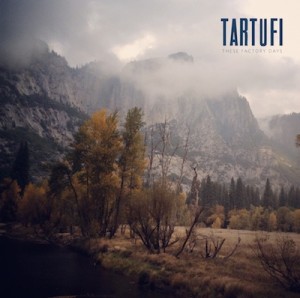If the sheer intensity of their sixth album, Nests Of Wires And Waves, etched Tartufi into your psyche, then this their latest record might well throw you off. With the addition of bassist Benjamin Thorne, the San Franciscans have captured a cohesive drive that has been lacking in the sonic rough-and-tumble of their previous records.
Thorne’s arrival, like a Promethean offering, is both a blessing and a curse for a band who, over their last couple of albums, have dredged through endless sonic flotsam to create rich and disjointed noisescapes. Cohesion in Tartufi’s music has previously come from picking their way through thickets of spindly tendrils, examining each footfall and allowing waves of melancholia to wash into their sound – ‘Engineering’ from 2009’s NOWAW is unsettlingly nomadic in its movement from squalling, percussive racket to pitchy emotional vocal lines and ending up in some folky backwater.
Thorne’s bassline opens the These Factory Days, setting the precedent for a series of songs make clear the significance of this beefed-up rhythm section. Yet this is an album that still leaps in every direction, allowing ideas of melody to sink in for a second before rapidly ripping them away; ‘Underwater”s repetitive bassline soon gets overshadowed by Lynne Angel’s plaintive wails of “Slip away from the fever and the flood you forgave” and you’re suddenly, quietly, reminded of an absence that you’ve been missing from everything else you’ve been listening to recently.
The mesmerising combination of musical styles remains a testament to Tartufi’s unacknowledged ambition; ‘Glass Eyes’ has a beautiful folkish charm with strings redolent of the Frames’ ‘Fitzcarraldo’, while ‘8_1’ sits so close to the likes of ()-era Sigur Ros that Angel’s repetitious lyrics could be from Birgisson himself. ‘Eaves’ is a master stroke, filled with distorted guitars and looping, building vocals that close halfway through only to re-open against a different, acoustic backdrop. The speed with which settings are established and unceremoniously ripped down while retaining some sort of cohesive momentum is staggering. Progressive in all senses of the word, Tartufi’s musical lineage seems lost to a much more sensory and exploratory way of approaching music.
The addition of Thorne’s rhythm-bolstering bass creates exciting new jumping off points for Angel and Gorman’s meanderings, and pushes to the fore again when their crashing escapades seem to be reaching suffocating crescendo. This is a move towards maturity that shows Tartufi refining their art, yet still dazzling with its scope.


